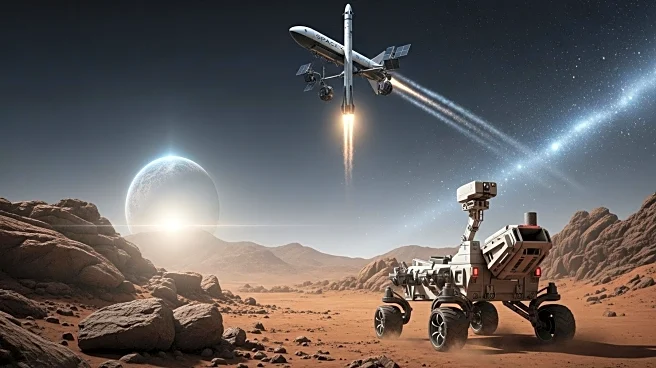What is the story about?
What's Happening?
NASA has announced a significant discovery by its Perseverance rover, which has identified potential biosignatures in a Martian rock sample. This finding, described as the closest evidence yet of possible life on Mars, was made in a sample from Jezero Crater. The discovery has been peer-reviewed and published in Nature, though NASA officials caution that the biosignatures could have non-biological origins. Meanwhile, SpaceX has launched the first 21 satellites of the U.S. Space Development Agency's 'Tranche 1 Transport Layer' into orbit. These satellites are part of a planned 126-satellite constellation aimed at providing global communications access for U.S. military forces. The launch marks the beginning of a new era in military satellite communications.
Why It's Important?
The potential discovery of biosignatures on Mars could have profound implications for our understanding of life beyond Earth, potentially reshaping scientific theories about the existence of life on other planets. This finding could also influence future Mars exploration missions and the search for extraterrestrial life. On the military front, the deployment of the 'Tranche 1 Transport Layer' satellites represents a significant advancement in U.S. military communications capabilities. This network is expected to enhance encrypted communications for U.S. forces, providing a strategic advantage in global military operations. The successful launch by SpaceX also underscores the growing role of private companies in national defense and space exploration.
What's Next?
NASA plans to further analyze the Martian samples, with the possibility of returning them to Earth for more detailed study in the 2030s. This could provide definitive answers about the presence of life on Mars. For the military satellite network, the U.S. Space Development Agency aims to achieve operational utility by 2026, with full global coverage expected by 2027. Additional satellite launches are planned to complete the constellation, and further testing will be conducted to integrate these capabilities into military operations.
Beyond the Headlines
The discovery of potential biosignatures on Mars raises ethical and philosophical questions about humanity's role in the universe and the implications of finding life beyond Earth. It also highlights the importance of international collaboration in space exploration. The military satellite network's development reflects a shift towards more resilient and flexible communication systems, which could influence future military strategies and the role of space in national security.

















